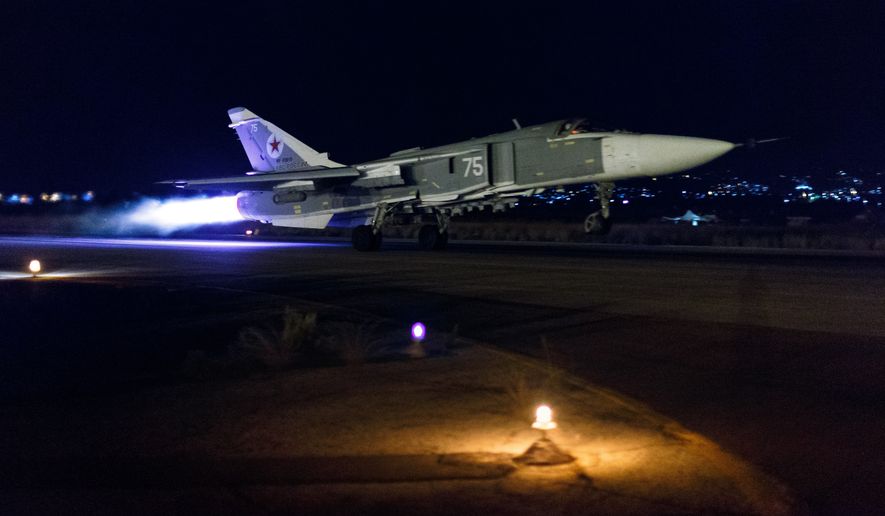The vast majority of Russian airstrikes in Syria are hitting rebels opposed to the Bashar Assad regime — not Islamic State terrorists — and, like the Syrian president’s forces, often make no effort to avoid hitting civilians, a study says.
Meanwhile, a former U.S. Air Force officer who commanded fighter wings tells The Washington Times that the Russian campaign is “very definitely effective” because it has given new life to the beleaguered Syrian armed forces and to Mr. Assad himself.
“Russia means business,” said retired Air Force Lt. Gen. Thomas McInerney. He said the Russians are flying more missions over Syria than the U.S. and are dropping unguided bombs that kill civilians indiscriminately and “intimidate” the rebels.
In a sign of unhappiness with more careful U.S. targeting, some members of Iraq’s parliament are so impressed by Russia’s air power that they want its strike jets to hit terrorists in Iraq.
The target assessment comes from the Institute for the Study of War. Citing on-the-ground reports from a multitude of sources, the Washington-based think tank says Russian jet fighters and helicopter gunships fly only a smattering of missions against the Islamic State’s terrorist army, the prime objective of the U.S.-led coalition’s year-old air campaign in Syria and Iraq.
The war institute lends credence to the Pentagon’s assertions that from the moment Russia started its bombing runs in Syria on Sept. 30, the real objective of President Vladimir Putin has been to destroy U.S.-backed rebel groups in a direct challenge to President Obama’s Syria strategy.
SEE ALSO: Vladimir Putin approval rating hits new high as Russia’s state media sells Syria campaign
The think tank’s report, “Russian Air Strikes in Syria,” states that the Russians’ target list is coordinated with Syrian ground forces attempting to move into rebel strongholds in the northwestern regions around the key city of Aleppo.
“The Russian air campaign in Syria increases the Assad regime’s asymmetric capabilities against the Syrian opposition,” the war institute says. “Like the Assad regime, Russia is likely willing to inflict heavy civilian casualties in the process.”
Human Rights Watch this month said it documented the unleashing of Russian cluster bombs on a rebel village of Kafr Halab in the northwest. Locals reported that the same indiscriminate munition was used on Oct. 11.
Mr. McInerney said Russia’s stepped-up sortie rate “reinvigorated Assad’s forces morale” and helped his military attack the U.S.-supported Free Syrian Army.
He noted that the coalition carried out 10 strikes one day last week, while the Russians said they completed almost 60.
“Russians are using dumb bombs except for their cruise missiles, so they have lots of collateral damage,” the retired Air Force general said. “But they don’t care, and it makes a more effective campaign to intimidate the Free Syrian Army and the Islamic State.”
Mr. McInerney said Mr. Putin’s insult that Washington has “mush for brains” in its Syria strategy shows how little regard the former KGB officer has for Mr. Obama.
On Wednesday, Army Col. Steve Warren, the top U.S. military spokesman in Baghdad, issued a blistering attack on the Russian air war. He said Russia has concentrated about 140 strikes, including cluster bombs, in the towns of Hama, Homs and Latakia, displacing 35,000 civilians.
“The Russians have been indiscriminate,” Col. Warren said. “They’ve been reckless in Syria. They seem to have no difficulty dropping cluster munitions around where civilians may be. They do not appear to be, based on their actions, they do not appear to be interested in defeating [the Islamic State]. They appear to be interested in preserving the Assad regime.”
On Iraq, he said the government has given no official request to Russia for airstrikes.
The Russian Defense Ministry responded by mocking Col. Warren’s briefing as “airy dreams” and depicting its own air campaign as more robust than the coalition’s.
“Airy dreams of Colonel Steven Warren concerning using cluster munitions by the Russian aviation in ’inhabited areas’ of Syria are absurd,” the Defense Ministry said. “It appears that the American colleagues have not established their aims in the announced war against the ISIS terrorist organization. This may be why the terrorists feel comfortable a year after the start of the anti-ISIS coalition’s operations.”
ISIS is one of the acronyms for the Islamic State.
In an upbeat Defense Ministry-written story on life at one of its air bases in Syria, the Russians said their Su-designated attack jets are “making pinpoint strikes against terrorist infrastructural facilities.”
It acknowledged hitting areas in Aleppo but asserted that all of its targets are either the Islamic State or unspecified “terrorists.”
The Defense Ministry said that, as the number of its spy drone missions increases, air commanders have a longer target list. One fighter can hit multiple targets before returning to base.
• Rowan Scarborough can be reached at rscarborough@washingtontimes.com.




Please read our comment policy before commenting.